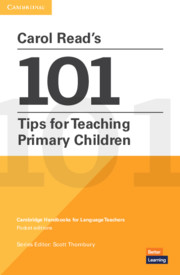Book contents
- Frontmatter
- Contents
- Acknowledgements
- Why I Wrote this Book
- A Getting Started
- B Core Skills
- C Classroom Management
- D Lesson Planning
- E Learning how to Learn
- F Storytelling
- G Playing Games
- H Values Education
- I Songs, Rhymes, Chants and Raps
- J Working with Projects
- K Intercultural Competence
- L Content-Based Learning (CLIL)
- M Thinking Skills
- N Vocabulary
- O Life Skills
- P Art, Craft and Design
- Q Mime and Drama
- R Inclusion and Diversity
- S Creativity
- T Adapting or Writing Materials
- U Listening and Speaking
- V Reading and Writing
- W Multiliteracies
- X Grammar
- Y Assessment
- Z The Last Word
- Glossary
- Selected Further Reading
- Index
M - Thinking Skills
Published online by Cambridge University Press: 28 October 2023
- Frontmatter
- Contents
- Acknowledgements
- Why I Wrote this Book
- A Getting Started
- B Core Skills
- C Classroom Management
- D Lesson Planning
- E Learning how to Learn
- F Storytelling
- G Playing Games
- H Values Education
- I Songs, Rhymes, Chants and Raps
- J Working with Projects
- K Intercultural Competence
- L Content-Based Learning (CLIL)
- M Thinking Skills
- N Vocabulary
- O Life Skills
- P Art, Craft and Design
- Q Mime and Drama
- R Inclusion and Diversity
- S Creativity
- T Adapting or Writing Materials
- U Listening and Speaking
- V Reading and Writing
- W Multiliteracies
- X Grammar
- Y Assessment
- Z The Last Word
- Glossary
- Selected Further Reading
- Index
Summary
The kinds of thinking skills that children need to develop at primary school include:
• Cognitive skills: for example, using deliberate memory, identifying and understanding relevant information, sorting, ordering, classifying, sequencing, comparing and contrasting, and linking cause and effect.
• Reasoning and enquiry skills: for example, justifying opinions, inferring, making deductions, asking relevant questions, anticipating problems and predicting outcomes.
• Creative and critical thinking: for example, critically evaluating things, generating and extending ideas, suggesting hypotheses and applying imagination.
• Metacognitive skills: for example, by reflecting on and evaluating learning and becoming aware of strategies for learning.
By integrating thinking skills in English lessons, children:
– extend and enrich their language repertoire;
– gain confidence in expressing their ideas;
– develop communication strategies;
– use language in ways that are personally meaningful;
– find lessons more interesting and challenging;
– learn skills which are potentially transferable;
– become more skilled at managing and evaluating their learning (see 17–19, 99 and 100).
My key tips for thinking skills are:
49 Use questions effectively
50 Use every opportunity to promote thinking
51 Teach ‘thinking language’
52 Use graphic organisers
49 Use questions effectively
Questions probe and extend children's thinking. However, in order to be effective, you need to select questions with care and give children opportunities to ask their own questions.
Teachers are usually good at asking questions but often not so good at giving children time to reply or listening to the answers. Typical questions tend to be IRF (Initiation, Response, Feedback), e.g. What colour's the bus? / Yellow. / Very good. While these kinds of closed questions allow children to display knowledge and encourage participation, particularly in lower primary, they do not take thinking further.
Some examples of ways to extend children's thinking are by asking probing questions that: are open-ended and invite children to express their thoughts, e.g. What do you like about …?; encourage children to give reasons or evidence for their opinions, e.g. Why do you think that? How do you know?; get children to clarify or be more specific, e.g. Can you give an example?; encourage hypothetical or creative thinking, e.g. What if …?; develop metacognitive thinking, e.g. How did … help you learn?; promote enquiry skills, e.g. How can we find out about …?.
It helps to direct different types of questions to different children depending on their confidence and level of language and cognitive competence.
- Type
- Chapter
- Information
- Carol Read’s 101 Tips for Teaching Primary Children , pp. 61 - 65Publisher: Cambridge University PressPrint publication year: 2020



